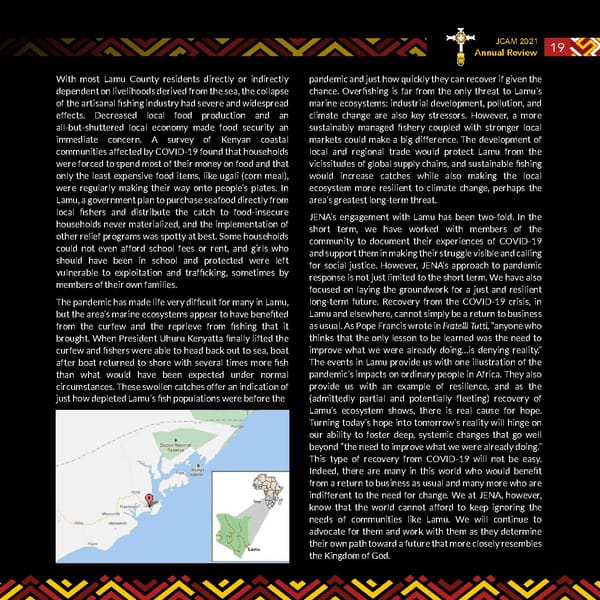JCAM 2021 19 Annual Review With most Lamu County residents directly or indirectly pandemic and just how quickly they can recover if given the dependent on livelihoods derived from the sea, the collapse chance. Overfishing is far from the only threat to Lamu’s of the artisanal fishing industry had severe and widespread marine ecosystems: industrial development, pollution, and effects. Decreased local food production and an climate change are also key stressors. However, a more all-but-shuttered local economy made food security an sustainably managed fishery coupled with stronger local immediate concern. A survey of Kenyan coastal markets could make a big difference. The development of communities affected by COVID-19 found that households local and regional trade would protect Lamu from the were forced to spend most of their money on food and that vicissitudes of global supply chains, and sustainable fishing only the least expensive food items, like ugali (corn meal), would increase catches while also making the local were regularly making their way onto people’s plates. In ecosystem more resilient to climate change, perhaps the Lamu, a government plan to purchase seafood directly from area’s greatest long-term threat. local fishers and distribute the catch to food-insecure JENA’s engagement with Lamu has been two-fold. In the households never materialized, and the implementation of short term, we have worked with members of the other relief programs was spotty at best. Some households community to document their experiences of COVID-19 could not even afford school fees or rent, and girls who and support them in making their struggle visible and calling should have been in school and protected were left for social justice. However, JENA’s approach to pandemic vulnerable to exploitation and trafficking, sometimes by response is not just limited to the short term. We have also members of their own families. focused on laying the groundwork for a just and resilient The pandemic has made life very difficult for many in Lamu, long-term future. Recovery from the COVID-19 crisis, in but the area’s marine ecosystems appear to have benefited Lamu and elsewhere, cannot simply be a return to business from the curfew and the reprieve from fishing that it as usual. As Pope Francis wrote in Fratelli Tutti, “anyone who brought. When President Uhuru Kenyatta finally lifted the thinks that the only lesson to be learned was the need to curfew and fishers were able to head back out to sea, boat improve what we were already doing…is denying reality.” after boat returned to shore with several times more fish The events in Lamu provide us with one illustration of the than what would have been expected under normal pandemic’s impacts on ordinary people in Africa. They also circumstances. These swollen catches offer an indication of provide us with an example of resilience, and as the just how depleted Lamu’s fish populations were before the (admittedly partial and potentially fleeting) recovery of Lamu’s ecosystem shows, there is real cause for hope. Turning today’s hope into tomorrow’s reality will hinge on our ability to foster deep, systemic changes that go well beyond “the need to improve what we were already doing.” This type of recovery from COVID-19 will not be easy. Indeed, there are many in this world who would benefit from a return to business as usual and many more who are indifferent to the need for change. We at JENA, however, know that the world cannot afford to keep ignoring the needs of communities like Lamu. We will continue to advocate for them and work with them as they determine their own path toward a future that more closely resembles the Kingdom of God.
 Jesuits Africa Annual review 2021 Page 20 Page 22
Jesuits Africa Annual review 2021 Page 20 Page 22